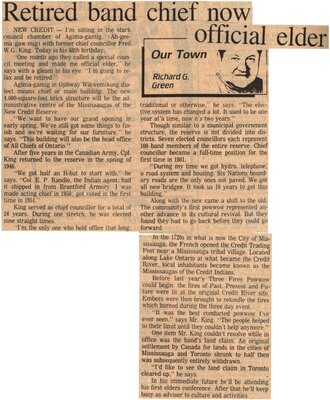"Retired Band Chief Now Official Elder"
- Full Text
- Retired band chief now official elder
NEW CREDIT - I'm sitting in the stark council chamber of Agima-gamig, (Ah-gee-ma:gaw mig) with former chief councillor Fred W.G. King. Today is his 68th birthday.
"One month ago they called a special council meeting and made me official elder," he says with a gleam in his eye. "I'm going to relax and be retired."
Agima-gamig in Ojibway Wikwemikong dialect means chief or main building. The new 4,000-square-foot brick structure will be the administrative centre of the Mississaugas of the New Credit Reserve.
"We want to have our grand opening in early spring. We've still got some things to finish and we're waiting for our furniture," he says. "This building will also be the head office of All Chiefs of Ontario."
After five years in the Canadian Army, Cpl. King returned to the reserve in the spring of 1946.
"We got half an H-hut to start with," he says. "Col. E. P. Randle, the Indian agent, had it shipped in from Brantford Armory. I was made acting chief in 1950; got voted in the first time in 1951."
King served as chief councillor for a total of 24 years. During one stretch, he was elected nine straight times.
"I'm the only one who held office that long, traditional or otherwise," he says. "The elective system has changed a lot. It used to be one year at a time, now it's two years."
Though similar to a municipal government structure, the reserve is not divided into districts. Seven elected councillors each represent 100 band members of the entire reserve. Chief councillor became a full-time position for the first time in 1981.
"During my time we got hydro, telephone, a road system and housing. Six Nations boundary roads are the only ones not paved. We got all new bridges. It took us 10 years to get this building."
Along with the new came a shift to the old. The community's first powwow represented another advance in its cultural revival. But they found they had to go back before they could go forward.
In the 1720s in what is now the City of Mississauga, the French opened the Credit Trading Post near a Mississauga tribal village. Located along Lake Ontario at what became the Credit River. Local inhabitants became known as the Mississaugas of the Credit Indians.
Before last year's Three Fires Powwow could begin, the fires of Past. Present and Future were lit at the original Credit River site. Embers were then brought to rekindle the fires which burned during the three day event.
"It was the best conducted powwow I've ever seen," says Mr. King. "The people helped to their limit until they couldn't help anymore."
One item Mr. King couldn't resolve while in office was the band's land claim. An original settlement by Canada for lands in the cities of Mississauga and Toronto shrunk to half then was subsequently entirely withdrawn.
"I'd like to see the land claim in Toronto cleared up," he says.
In his immediate future he'll be attending his first elders conference. After that he'll keep busy as adviser to culture and activities.
- Mystery Question
- When was this article published?[Please answer by clicking on the Comments tab]
- Creator
- Green, Richard G., Author
- Media Type
- Newspaper
- Item Types
- Articles
- Clippings
- Description
- "I'm sitting in the stark council chamber of Agima-gamig, (Ah-gee-ma:gaw mig) with former chief councilor Fred W. G. Fred. Today is his 68th birthday."
- Subject(s)
- Personal Name(s)
- King, Fred W. G.
- Local identifier
- SNPL002580v00d
- Collection
- Scrapbook #1 by Janet Heaslip
- Language of Item
- English
- Geographic Coverage
-
-
Ontario, Canada
Latitude: 43.00011 Longitude: -80.08295
-
- Creative Commons licence
 [more details]
[more details]- Copyright Statement
- Public domain: Copyright has expired according to Canadian law. No restrictions on use.
- Copyright Holder
- Brantford Expositor
- Contact
- Six Nations Public LibraryEmail:info@snpl.ca
Website:
Agency street/mail address:1679 Chiefswood Rd
PO Box 149
Ohsweken, ON N0A 1M0
519-445-2954



